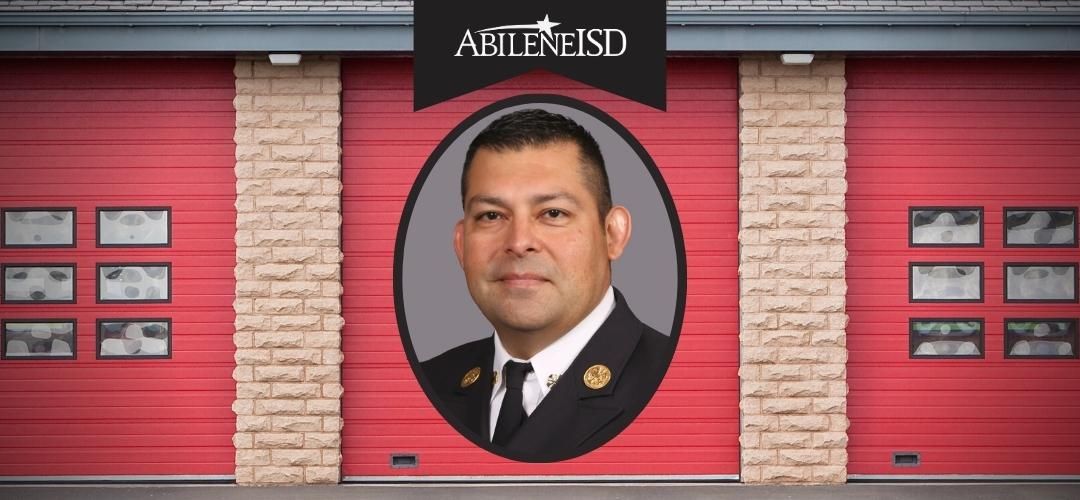But one day in 1992, as he was finalizing his paperwork to enroll at Texas Tech University, a friend told him he was going to take the civil service exam so that he could enroll in the fire academy. He told Flores that he didn’t want to take it alone, so he asked him to go with him.
Not thinking much of it, Flores went with his friend, scored well enough on the test and was accepted into the fire academy. A career was born.
Flores hit the floor in 1992, served as a lieutenant from 2004-06, captain from 2006-15, deputy chief from 2015-18, and 26 years into his career – on June 1, 2018 – he became the fire chief, replacing Larry Bell.
An Abilene native, Flores has spent his life in his hometown, attending Valley View Elementary School, Franklin Junior High School, and Abilene High School. As a 1990 AHS graduate with a plan to enter law enforcement, he enrolled at Hardin-Simmons to major in criminal justice. He played on the HSU football team in 1990, the university’s first team since 1964, but after one year, he decided it was time to move on from Abilene.
“I was born and raised here, and I’ve tried to get out a couple of times, but for some reason, it never worked out,” Flores said. “I’ve had a couple of opportunities to leave, but things kept me here, and it’s worked out well.”
During those early years of his education, he said he was impacted by teachers at every stop in the Abilene ISD, specifically citing coaches Randall Edwards and Henry Willis at Abilene High as two men who made a lasting impression on him.
“Both of those men were people I looked up to and who were great mentors to everyone,” Flores said.
Flores met his wife, Jennifer, after both graduated from Abilene High, and they have been married for almost 29 years. They’ve raised four children – three daughters and one son – and all have gone through the AISD and graduated from AHS.
We recently caught up with Flores to discuss his life in the fire department, the challenges the department has faced since becoming chief, and what he’s learned about leadership during his tenure.
Q: Tell me about these 31 years you’ve been part of the Abilene Fire Department and what it’s meant in your life.
Flores: “It’s been crazy. As a firefighter some of us have that drive to be in leadership positions, and some are fine being a firefighter. I was kind of in the middle. I was always one of those guys who thought it was my responsibility to take the next step. I never had a drive to be the fire chief, but as the position became available, I felt like it was something I needed to do. It was challenging the first couple of years with the tornado (May 2019), a couple of large fires, and the winter storm that came through that challenged our resources. But things have leveled out in the last couple of years, and it’s been good. This is the best job I ever could have hoped for as a firefighter.”
Q: You’ve been at every level of the fire department, from the bottom rung on the ladder to now the chief. What’s the most challenging part of this life?
Flores: “There are some jobs in the fire department where you’re part of operations, but you have a hand in administration, so you’re still one of the guys. But once you transition to full-time administration, which I did when I became a deputy chief, it’s different because you’re looked at differently. You have a different connection to the department, and as much as you still want to be one of the guys, you’re not. You work on behalf of the fire department and the city at that point instead of the firefighters. Our intentions are still to do what’s best for the firefighters at all times, but you’re never looked at that way. The guys see you as a different person. You no longer have their confidentiality as you did before the move to administration. You have to have their trust, and I think we do. But sitting down with guys and talking like we used to is different now.”
Q: Does that change bother you?
Flores: “It does, to a degree. You like to be friends with people, but friendship has good and bad with it now. Unfortunately, there has to be a limit as a person you can spill with others. I can hear complaints all day long from 198 firefighters, but I can never complain to them, so it does make some of that communication one way.”
Q: You have 198 firefighters that, essentially, you’re responsible for and want to keep safe. What’s it like to go to bed every night and wake up every morning worrying about their well-being?
Flores: “That’s a heavy burden, but if you become an officer in this department – and that starts at lieutenant – you start to take on that responsibility at that point. You’re doing something wrong if you’re not thinking about it before becoming chief. There is a lot of responsibility, but experience helps with that. When I leave this office, I leave some things and don’t take them home. But the responsibility doesn’t change.”
Q: What are some things you can leave at the office?
Flores: “I can leave projects the city asks me to work on – budgeting, planning, etc. – here at the office. But personnel issues, preparation for something that might be coming up, go home with me. People ask me about my work hours, and it’s 24/7. Me and my two deputy chiefs – if we’re in town, and to a larger degree, if we’re in the state – we’re working. I have a portable radio beside my bed that’s on while I sleep. I have a computer in my dining room with a screen that shows where our crews are, and I look at that every night when I get home. Most things don’t keep me up at night unless it concerns personnel.”
Q: What have you learned about leadership in this job?
Flores: “You have to be adaptive to be effective. This fire department is not the same one I joined 31 years ago. The fire service, in general, is so much different now than in 1992. We’re a much younger department today than we have been in the past. Challenges come with youth because today’s youth aren’t raised like my generation. I’m not saying there’s anything wrong with that, but it’s a difference, and we have to be prepared to deal with those different mentalities and expectations. If you can’t adapt to what your personnel expect from you, then they won’t trust your leadership. You’ve got to be able to lead on their level rather than your own.”
Q: Right after you became chief in 2018, the city went through the tornado in May 2019 on the west side of town, COVID, Winter Storm Uri in February 2021, and a couple of significant fires. Out of all of those things, which one was the most difficult to handle?
Flores: “It had to be COVID. I think COVID taxed everyone. It was a no-brainer to me and my staff when we were asked to go out and give the vaccine shots. Then, we had some concerns about the possibility of our guys taking COVID home to their families, but everyone understood it was part of our job. As the leader, I couldn’t dismiss those concerns; they had to be addressed, and I did my best. We got through it, but it was very taxing. But what makes all of those challenges manageable is a great support staff, and that’s what I have. Even though I’m the guy at the top, I never decide by myself. We make decisions and move forward collectively; that united front is critical.”
Q: You’re the first minority to be in this position in Abilene. Is that an extra burden on you, and how do you handle it?
Flores: “I’m very proud to be who I am and where I am. I’m proud of my heritage, but don’t think it’s an extra burden. I’ve known from Day 1 that I can’t screw up. This job, regardless of who I am, I’m the fire chief, and mistakes will be highlighted no matter what. Our community is about 40 percent Hispanic, so I see many people out there who relate to me and who didn’t have someone like that before, so I see that as a blessing. I try to be very available whenever asked to participate, and I enjoy it.”












